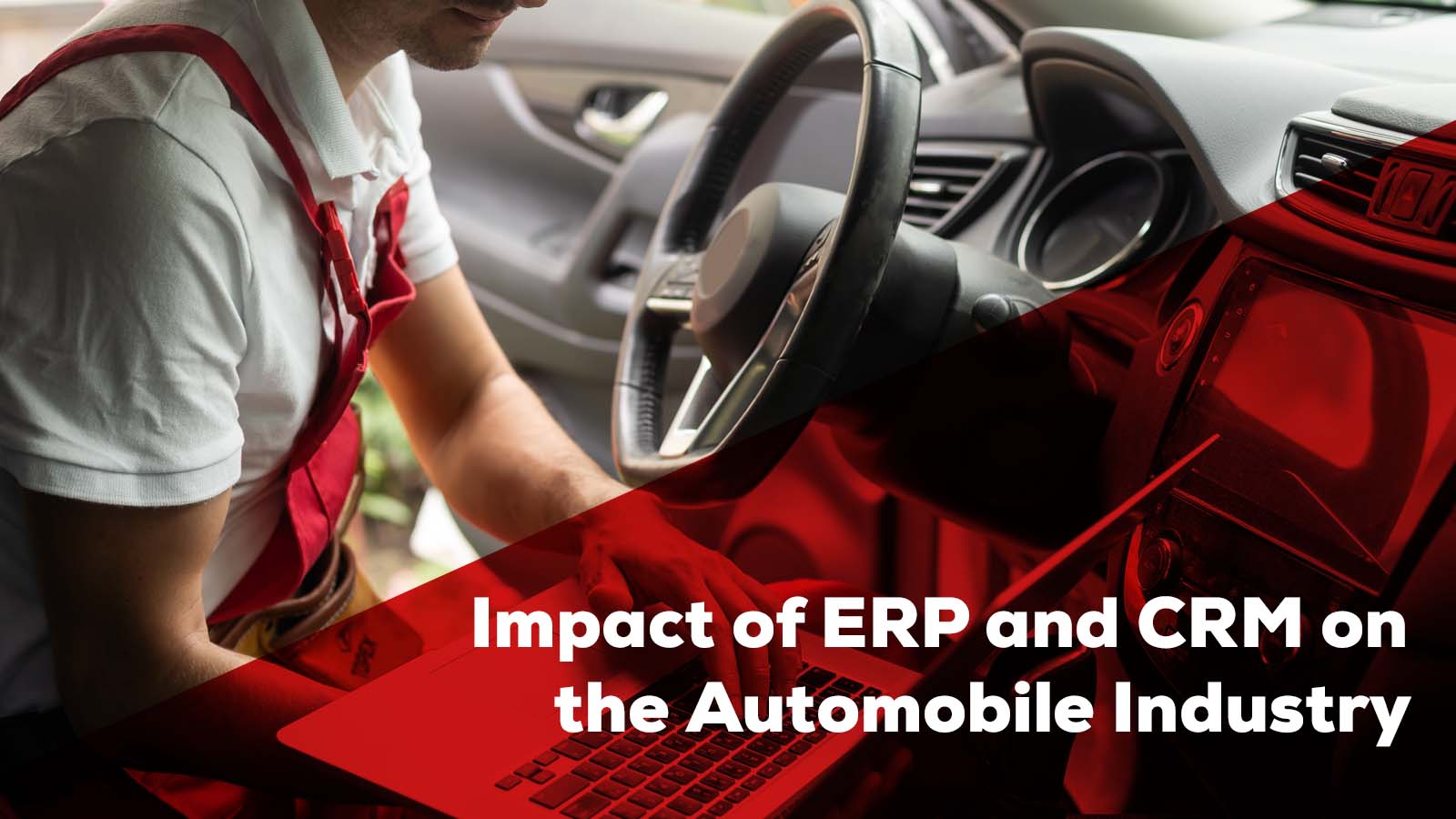Introduction
In the rapidly evolving landscape of the automotive industry, a technological revolution is leading innovation. At the forefront of this transformation are Enterprise Resource Planning (ERP) and Customer Relationship Management (CRM) systems, seamlessly integrating operations and reshaping the future of automotive excellence.
This blog post highlights the impact of these integrated solutions on operational efficiency and customer satisfaction.
Understanding ERP in the Automobile Sector
ERP, a comprehensive software solution, streamlines operations by integrating various business processes. In the automotive sector, its application goes beyond conventional business functions to address the complexities of manufacturing, supply chain, and quality control. Tailored ERP modules cater specifically to the unique needs of automobile manufacturers, ensuring a cohesive and efficient system.
Inventory Optimization and Demand Forecasting
ERP transforms supply chain management by optimizing inventory and providing accurate demand forecasts, mitigating the impact of fluctuations in market demand.
Vendor Relationship Enhancement
Efficient vendor relationship management is a byproduct of ERP, fostering collaboration and ensuring a seamless flow of materials.
Real-time Monitoring and Adaptive Manufacturing
Real-time monitoring enabled by ERP allows manufacturers to adapt swiftly to changing production requirements, enhancing overall efficiency.
Quality Control Advancements
ERP facilitates advanced quality control measures, ensuring that every unit rolling off the production line meets the highest standards.
CRM Demystified: Nurturing Customer Relationships
CRM is the driving force behind building and maintaining robust customer relationships, playing a pivotal role in the highly competitive automotive market. Through analyzing and storing data on potential and existing customers, CRM software nurtures customer relationships throughout the customer journey.
Pre-purchase Engagement Strategies
CRM strategies extend beyond the purchase, engaging customers at every stage of their journey, from awareness to consideration and decision-making.
Post-purchase Customer Support and Satisfaction
Post-purchase engagement ensures customer satisfaction, fostering loyalty and advocacy in an industry where brand loyalty is a coveted asset.
Common Misconceptions
Myth #1: ERP and CRM are Exclusively for Large Corporations
Dispelling the myth that ERP and CRM are exclusive to large corporations, we explore how these solutions are equally beneficial for small and medium-sized automotive businesses.
Myth #2: Implementation is Disruptive and Time-Consuming
Addressing concerns about disruptive implementations, we delve into strategies that minimize downtime and ensure a smooth transition to integrated systems.
Future Trends in ERP and CRM for Automobiles
The future of ERP and CRM in the automotive industry is marked by transformative trends. Integration of IoT into ERP systems enables real-time connectivity, enhancing data flow for accurate forecasting and predictive maintenance. Supply chain visibility is heightened, and AI-driven predictive analytics revolutionizes decision-making. CRM systems evolve towards personalized customer experiences through data analytics and omni-channel solutions. Blockchain ensures supply chain transparency, while AR in CRM transforms customer service. Cloud-based solutions, robust cybersecurity, and collaborative integration between ERP and CRM systems contribute to an agile, sustainable, and user-driven industry landscape.
The Global Landscape: ERP and CRM Adoption in Different Regions
North America
North America’s businesses in the automotive sector are quick to embrace cutting-edge technologies to gain a competitive edge. The robust IT infrastructure and a culture of innovation contribute to the successful implementation of these systems.
Businesses leverage data insights to enhance efficiency, improve customer relationships, and drive strategic initiatives through ERP and CRM software. Given the diverse industries present in North America, ERP and CRM solutions are often customized to meet the specific needs of different sectors.
The trend of adopting cloud-based ERP and CRM solutions is common in North America, which allows businesses to access real-time data and ensure seamless collaboration across multiple locations.
Europe
Europe has embraced ERP and CRM integration to enhance operational efficiency. Europe places a strong emphasis on compliance and regulation, influencing how ERP and CRM systems are implemented. Adherence to data protection laws and industry-specific regulations is a priority, especially in the automotive sector where sensitive customer information is involved. ERP and CRM systems facilitate seamless cross-border collaboration, which is particularly crucial for multinational automotive companies with operations spanning multiple European nations. In line with Europe’s commitment to sustainability, ERP systems often include modules addressing environmental concerns. This is reflected in supply chain practices, production processes, and even CRM strategies that align with green initiatives. With the prevalence of mobile technology, European businesses prioritize mobile accessibility in their ERP and CRM solutions.
Asia-Pacific
The Asia-Pacific region experiences rapid ERP and CRM adoption, especially in emerging markets. As the automotive industry expands across the region, companies are quick to embrace integrated solutions for scalability. In the automotive sector, understanding and catering to local preferences is crucial, and integrated systems are adapted to accommodate these variations. The prevalence of mobile technology in Asia-Pacific has led to a mobile-first approach in ERP and CRM usage. Scalability is a key consideration in Asia-Pacific, where businesses, particularly in the automotive sector, are poised for rapid growth. ERP and CRM systems are implemented with an emphasis on accommodating increasing demands and expanding operations. ERP and CRM systems often integrate seamlessly with online platforms. This is crucial for automotive companies looking to leverage digital channels for sales, customer engagement, and after-sales services.
Conclusion
The integration of ERP and CRM in the automobile industry is a strategic move toward sustainable success. As we reflect on the journey so far, the road ahead promises even more exciting possibilities. For businesses looking to stay ahead of the competition, utilizing the potential of ERP and CRM is crucial.
Frequently Asked Questions (FAQs)
How does ERP benefit small and medium-sized automotive businesses?
ERP enhances operational efficiency, streamlining processes like supply chain management and inventory control. Small and medium-sized automotive businesses benefit from improved visibility, better decision-making, and cost control. Studies show a 95% improvement in operational efficiency, a 50% reduction in decision-making time, and a 20% cut in operational costs within the first year of implementing ERP.
Can CRM improve brand loyalty in the fiercely competitive automobile market?
CRM fosters brand loyalty by providing personalized customer experiences and effective communication. Personalized marketing yields a 5-8 times higher return on marketing spend. CRM systems also contribute to customer retention by identifying and resolving issues promptly, with a potential 25-95% increase in profits through a 5% increase in customer retention.
What challenges do automobile manufacturers commonly face during ERP implementation?
Challenges in ERP implementation for automobile manufacturers include organizational resistance, data migration complexities, and integration issues. Approximately 70% of change programs fail due to employee resistance, and 75% of ERP projects face issues related to data migration.
Is CRM only relevant for B2C automotive companies?
CRM is relevant for B2B automotive companies, aiding in managing complex relationships with business partners, improving sales efficiency, and facilitating personalized communication. Research indicates a 65% improvement in relationships with business partners and a $8.71 return on every dollar spent on CRM applications.
How can ERP and CRM foster innovation in product development?
The integration of ERP and CRM systems enhances collaboration, communication, and decision-making, fostering innovation in product development. Improved collaboration doubles the likelihood of being top performers in innovation. ERP contributes by optimizing internal processes, reducing time-to-market, and achieving a 23% reduction in time-to-market for new products. CRM’s focus on customer feedback is crucial, with 61% of executives considering it the most important source of innovation.








